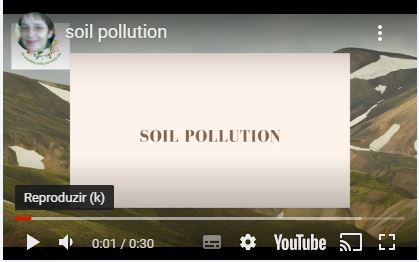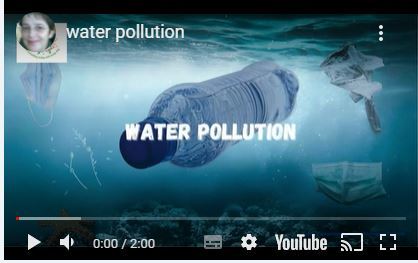22nd April - Earth Day
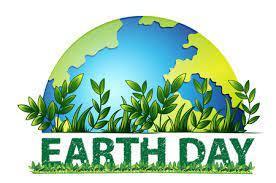
According to https://www.earthday.org/history/, the first Earth Day was celebrated in 1970 as in the decades before Americans were consuming vast amounts of leaded gas through massive and inefficient automobiles.
"Earth Day 1970 achieved a rare political alignment, enlisting support from Republicans and Democrats, rich and poor, urban dwellers and farmers, business and labor leaders. By the end of 1970, the first Earth Day led to the creation of the United States Environmental Protection Agency and the passage of other first of their kind environmental laws, including the National Environmental Education Act, the Occupational Safety and Health Act, and the Clean Air Act. Two years later Congress passed the Clean Water Act. A year after that, Congress passed the Endangered Species Act and soon after the Federal Insecticide, Fungicide, and Rodenticide Act. These laws have protected millions of men, women and children from disease and death and have protected hundreds of species from extinction."
SPAIN
This year, we wanted to recover the spirit of Sing for Climate Song, which went viral in Belgium around 2012 and has made a video to celebrate Earth Day. In this video, teachers from different Erasmus projects, normal classes, SEN students, and school staff have worked together in order to raise awareness of the importance of taking care of our planet.
PORTUGAL
Many events are held throughout the year to educate young people of all ages about the value of protecting the environment. Here are some examples:
The students from our elementary schools have created a series of activities under the "Eco-Schools" program that are targeted at altering environmental behavior. Students set out to read Sofia Quaresma's book Tomé, "O gaio semeador" in collaboration with the school
library since it encourages environmental conservation and appreciation for biodiversity.
With the help of experts from the Landscape Laboratory, the second-year students helped the jay Tomé, an involuntary sower, and a few months later the seeds planted in the earth germinated and were planted in the garden between the two schools: a communal garden where we can discuss our texts...Planting a tree is like sowing and defending. Reading for enjoyment is a way to learn.
The Landscape Laboratory and Leroy Merlin sponsored the planting of fruit trees in the playgrounds of the two elementary schools. The song "A tree is a friend" marked the end of the
school day at Santa Luzia. The guitar and other musical instruments provided the background
music as the students sang. Everyone joyfully sang to commemorate this day!
Sustainability of the planet
From the selected cartoon the students, while working in groups, present their point of view in the form of questions: Should we reflect on our attitudes and recent behavior? Is there urgency in preserving our planet? What is sustainable development? What’s the purpose of innovating technologies in the maintenance of sustainable development? They also chose an innovative technology which brought them higher curiosity and explained to their colleagues their function.
International Day of the tree
Presentation with the story of Lynne Cherry, “The great kapok tree” with the intention of making us reflect on the importance of the forest today and forever.
Day of Eco-schools
The celebrations start with the raising of the flag. Next, the students read a letter to the adults in order to grow their Eco-mind. By last, commitments of the families to the environment are made.
The Eco-Schools Green Flag is an international award created in Portugal by ABAE that aims to promote actions and honor the quality of work produced by the school in the context of environmental sustainability education.

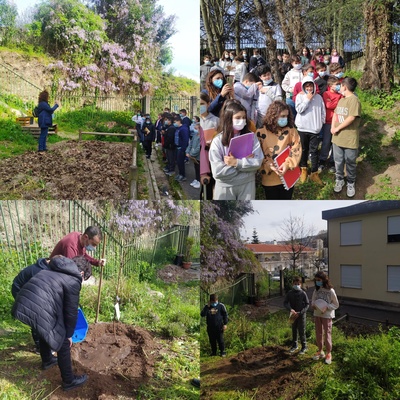
Delivery of awards Eco-schools
Realize activities such as planting seeds, robotic demonstrations, and Eco-detective games.
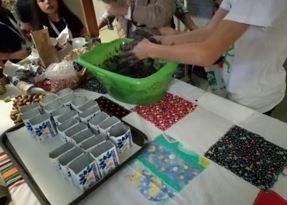
2020 ECOCODE
Students in the eighth grade were given the challenge of creating a group poster for the National Eco Code Contest as part of the visual education class.
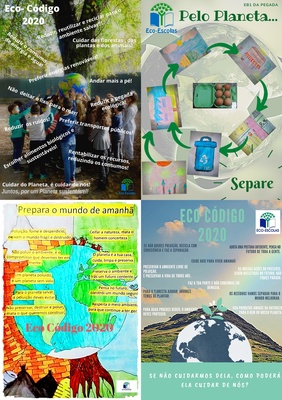
Recycled Faces
The base idea for the projects was to make faces out of old materials, recycle them, and encouraging the students to avoid waste and be eco-friendly.
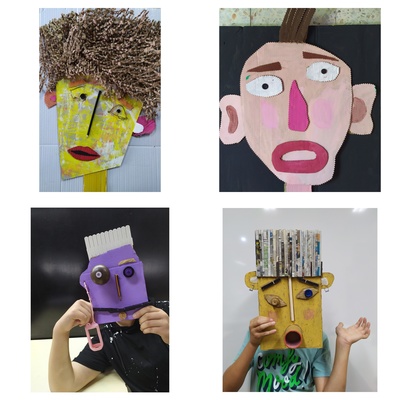
Climate Action
The students put their Green Flag at half-mast and went to their street to pick up cigarette butts... and in a short journey, many butts were collected. Thus, they avoid the increase in the amount of that waste that reaches water courses and the sea.
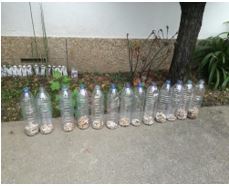
Eco-School: Game of recycling
A technician of our recycling center, “Resinorte'', explains how students should separate the trash with fun activities and games. Phrasing that everyone has a part to play if they want to save the planet.
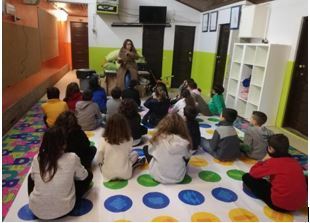
River Ave Ambassadors
As a part of the project “Ave for everyone”, students took on the mission to spread a bit of our natural heritage to the population.
Lockers through the planet
The students at the invitation of the project “Pegada” manifest their love for the Planet through heart-shaped lockers. These are made with recycled materials and were spread through the school.
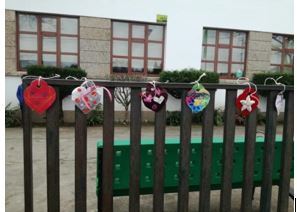
Plastic: 2nd Life
During the school year campaigns were made to raise awareness of the importance of recycling as well as the possibility to give it another life inside the school.
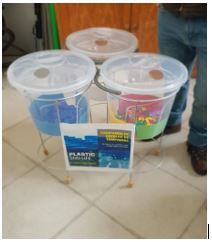
"Plastic: The Threat of Our Rivers" - Webinar
At the invitation of the Landscape Laboratory within the scope of the project "Aqualastic: Educate, Reduce and Value", students participated in the Webinar on the problem of plastic pollution in aquatic and terrestrial ecosystems, entitled "Plastic: The threat of our rivers"
Webinar - Waste Management
A webinar on Waste Management started with an interactive and pedagogical activity through a game on Kahoot. During the session, the speaker explained the importance of waste separation, referring to the principles of the Circular Economy and the three pillars of Sustainable Development: environmental, economic, and social.
Composting at School
As part of the international RiskAquaSoil project and in partnership with the PEGADAS program, the Landscape Laboratory delivered 1 domestic composter to the School. An explanatory session was held about the composting procedure. Small specimens of composters were set up using empty bottles, soil, dry leaves, and organic residues. After this first phase, the class produced a dissemination video that was presented in the classes to disseminate the procedure and raise awareness of the school community.
Workshop – “Climately speaking”.
The Workshop was held online, through the Zoom platform, and approximately one hundred students participated. The activity was carried out in two parts: Lecture «Climately Speaking», which aimed to make students aware of the climate emergency that current society is experiencing and the importance of each one's action/intervention in mitigating the problem, and an Interactive game, aimed at raising awareness of the difficulties of a future with fewer resources for human life (as well as other forms of life). Students in working groups would have to present solutions to the challenges posed.
Collaboration in the Limp.Ar project
The Limp.AR project aims to respond to the need to promote the improvement of air and noise quality in urban centers, seeking to encourage the integration of vegetation into the urban environment and raise awareness of the importance of reducing commuting. The project integrates education, training, citizen awareness actions, participatory co-creation actions, interventions in urban spaces, and actions to assess the quality of air and noise in different contexts. Led by the Landscape Laboratory, the Limp.AR project, approved by the Environmental Fund of the Ministry of Environment and Climate Action.
eTwinning project - Hand in hand with the Planet
The Project focuses on three of the Sustainable Development Goals (13, 14, and 15) and aims to make students aware of pressing environmental issues, in order to form informed, committed, responsible and critical citizens. All activities aim to promote collaborative work between partner schools, empower students digitally, experience learning creative writing for pleasure, and communicate in a foreign language (English and Spanish).
eTwinning project - Do something today and every day
Our ecosystem is constantly changing and we have some questions that make us think.
Are individuals responsible for climate change? Can our habits have side effects on the environment? What kind of environmental problems are we aware of? What are the major problems? How can we solve the environmental problems? What are ecological habits? How can we integrate eco-friendly habits into our daily life?
With this project, we want to raise awareness about environmental issues. The students will learn by teaching other students what "eco-friendly, environmentalist, go green, pollution, etc." means. Students will collaborate and discover how to solve environmental problems together.
